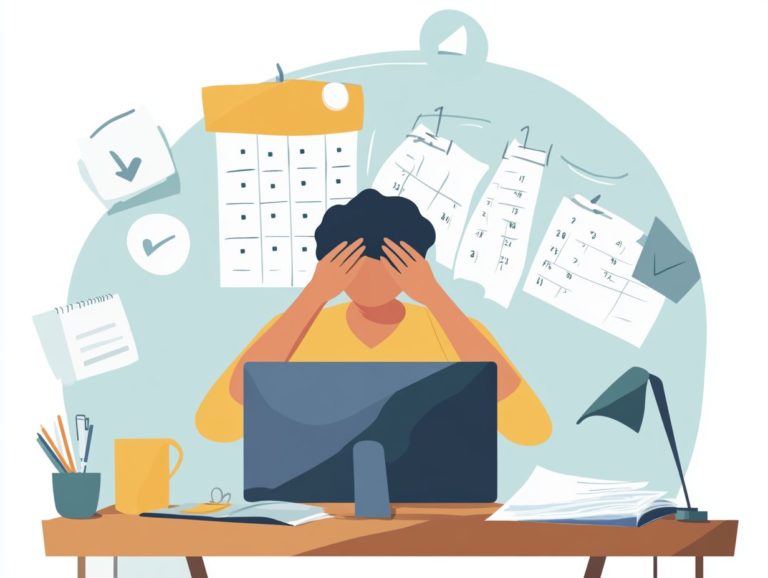How to Navigate the Claims Process After an Accident
Navigating the claims process after an accident can seem daunting. However, understanding the necessary steps can significantly lighten your load.
This guide will empower you with crucial steps. Dive in now to be fully prepared!
This guide outlines each stage, from gathering crucial evidence to negotiating settlements. It details the documentation you need to collect and provides insights on filing your claim, ensuring you’re ready to engage with insurance companies effectively.
It highlights when seeking legal help can be beneficial. Arm yourself with the knowledge needed to confront your claims process with confidence!
Contents
- Key Takeaways:
- Understanding the Claims Process
- Gathering Evidence and Documentation
- Filing a Claim
- Negotiating a Settlement
- Dealing with Insurance Companies
- When to Seek Legal Assistance
- Frequently Asked Questions
- 1. What should I do immediately after getting into an accident?
- 2. Do I need to report the accident to my insurance company?
- 3. How do I file a claim with my insurance company?
- 4. What if the other driver is at fault for the accident?
- 5. Will my insurance rates increase after filing a claim?
- 6. What happens if the at-fault driver does not have insurance?
Key Takeaways:
- Be prepared for the claims process by understanding the steps involved. Know what evidence and documentation to gather and how to organize it.
- Filing a claim can be complex, so know how to submit it properly to increase your chances of a successful outcome.
- When dealing with insurance companies, know your rights and how to protect them. Consider seeking legal assistance if needed to ensure fair treatment and a favorable settlement.
Understanding the Claims Process
The claims process after a car accident can be intricate. To navigate it effectively, you must have a comprehensive understanding of the steps to file an auto insurance claim successfully to secure compensation for personal injury and property damage.
It starts with assessing the accident scene. Gather documentation such as the police report and recognize the importance of seeking medical attention for any injuries sustained during the collision.
Grasping these steps lays the groundwork for filing effective insurance claims, determining fault, and navigating the complexities of legal proceedings that can impact your compensation outcomes.
Overview of the Steps Involved
An effective claims process for a car accident involves clear steps designed to ensure a thorough insurance claim and accurate fault determination. Following tips for a smooth auto insurance claim experience can greatly assist in navigating this process.
In the immediate aftermath of the accident, you must gather all necessary documentation, including insurance details and police reports. Compiling witness statements can provide valuable insights that may prove instrumental in your claims process.
Understanding local fault laws is essential; these laws determine who is responsible for the accident and can significantly influence the outcome of your injury claim.
By systematically organizing this information, you can navigate the complexities of insurance negotiations more effectively. This strengthens your position when seeking compensation for your injuries.
Gathering Evidence and Documentation
Collecting comprehensive evidence and documentation is essential when filing an insurance claim after a car accident. This significantly influences the outcome of both personal injury and property damage claims.
Collect information from the accident scene. This includes photographic evidence of vehicle damage, details of your injuries, and relevant medical records.
This documentation acts as a crucial asset in supporting your claims process and aids insurance adjusters in determining fault and establishing appropriate compensation amounts.
What to Collect and How to Organize
When in a car accident, it’s crucial to have an accident checklist to ensure you gather all necessary information. This includes personal details of everyone involved, witness statements, and repair estimates.
Creating a thorough accident checklist streamlines the process. Record the contact details of all parties, including their phone numbers and insurance information. Don t overlook the importance of documenting witness statements; those third-party observations can be invaluable when piecing together the events.
Collecting repair estimates from certified providers helps you assess the vehicle damage and strengthens your insurance claims. Understanding your insurance policy is key! Knowing your coverage, deductibles, and conditions can make a big difference when filing a claim and navigating any complexities that arise.
Filing a Claim
Filing a claim after a car accident is an essential step toward securing the compensation you deserve for any injuries and property damage. Understanding your policy during this critical time can help navigate the claims investigation process with your insurance company, making it easier to understand your policy during the claims process.
You’ll need to submit the accident report, clearly describing the circumstances of the incident, and engage with a claims adjuster to present your compensation claims. Understanding the claims process in Virginia can greatly impact the outcome of your case and ensure that you receive the fair treatment you rightfully expect.
How to Submit Your Claim
To effectively submit your claim, ensure you gather all the necessary documentation that supports your position this will be crucial in the insurance claim process.
This means collecting relevant medical records, photographs of damages, police reports, and detailed bills that outline your expenses. Once you ve organized your documentation, take the time to familiarize yourself with the claims procedures specific to your insurance provider, as each company may have its own unique forms and protocols to follow.
By understanding the steps involved, including how to provide the necessary evidence promptly, you ll enhance your chances of securing fair compensation. Don t underestimate the importance of knowing your legal rights! This knowledge can significantly impact the resolution of your claim and the thoroughness of the insurer s investigation.
Negotiating a Settlement
Negotiating a settlement after a car accident can be a complex journey that demands both adept negotiation skills and a solid grasp of your rights and potential compensation claims.
Talking effectively about settlements requires you to present your case persuasively to insurance adjusters. It may also be wise to enlist the help of legal counsel to champion your interests.
This phase is crucial for getting the most compensation and ensuring you receive a fair settlement for your injuries and damages.
Tips for Negotiating Effectively
To negotiate effectively after a car accident, it s crucial for you to hone strong negotiation skills, as these can greatly influence the compensation you ultimately receive.
Before diving into discussions with insurance claims adjusters, take the time to thoroughly prepare by researching your legal rights and gathering all relevant documentation, such as medical records and accident reports. Additionally, practice articulating your needs and expectations with clarity; this will give you the power to communicate assertively during negotiations.
Understanding the true value of your claim is essential in setting realistic goals. You should be your own advocate, staying informed and confident, so you re not easily swayed by those lowball initial offers. Being proactive and organized helps you level the playing field and engage more effectively with adjusters.
Dealing with Insurance Companies
Navigating the world of insurance companies following a car accident demands a solid grasp of your legal rights and the intricacies of the claims process. It’s equally important to understand how insurance adjusters function during the determination of fault.
Know Your Rights and How to Protect Them
Understanding your legal rights is crucial when navigating the maze of insurance companies. This knowledge gives you the power to protect your interests during the claims investigation and compensation process.
Having a firm grasp of how your insurance coverage operates is crucial, especially as different policies may offer varying levels of protection. As an accident victim, it s important for you to familiarize yourself with your specific provisions and exclusions to avoid unnecessary pitfalls. Comprehending the claims process can significantly enhance your ability to advocate for fair compensation.
Compiling evidence, such as medical reports and accident documentation, will bolster your case. Engaging with legal professionals or support groups can provide you with valuable insights, ensuring you navigate your claims with confidence and assertiveness.
Remaining proactive and knowledgeable in these situations can truly make all the difference in achieving just outcomes.
When to Seek Legal Assistance
Understanding when to seek legal assistance after a car accident can profoundly impact the success of your claims process, particularly concerning personal injury and settlement negotiations. Legal assistance involves hiring professionals who can guide you through the complexities of your case and advocate on your behalf.
Signs You May Need a Lawyer
After a car accident, certain signs may indicate that you need a lawyer. This is especially true if you face challenges with your personal injury claims or issues with your insurance company.
If the accident has resulted in high medical bills or a lengthy recovery, handling compensation claims can become overwhelming. If your communication with the insurance adjuster has become difficult or confrontational, it s time to consider legal help.
If there s a dispute over liability who is responsible for the accident and multiple parties are involved, a lawyer can provide essential guidance. This situation can significantly affect your financial stability and emotional well-being, making it crucial to protect your rights.
Frequently Asked Questions
1. What should I do immediately after getting into an accident?
Check for injuries and call for medical help if needed. Then move your vehicle to safety and contact the police to file a report.
2. Do I need to report the accident to my insurance company?
Yes, report the accident to your insurance company as soon as possible. Most policies have a time limit for reporting accidents, so it s best to do it right away.
3. How do I file a claim with my insurance company?
Contact your insurance provider and provide details about the accident, including the date, time, location, and involved parties. They will guide you through the claims process.
4. What if the other driver is at fault for the accident?
If the other driver is at fault, you can file a claim with their insurance company. Be sure to collect their insurance info and contact details to make the claims process smoother.
5. Will my insurance rates increase after filing a claim?
It depends on your policy and the accident’s circumstances. If you weren’t at fault and have a clean driving record, your rates may not increase. However, if you are at fault or have multiple claims, they could go up.
6. What happens if the at-fault driver does not have insurance?
If the at-fault driver lacks insurance, you may need to file a claim with your own insurance under your uninsured/underinsured motorist coverage. This type of coverage protects you in accidents involving uninsured drivers.



